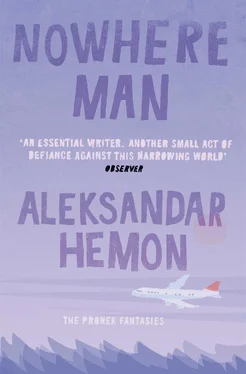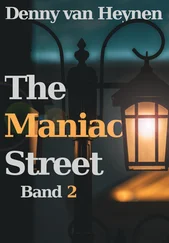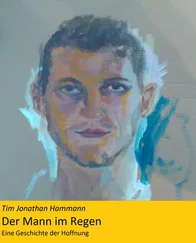And a couple of years after coming out of the army on a Tuesday morning, Pronek woke up happy, leapt out of bed, and left his room singing to himself “Something Stupid,” the Sinatra song. He cordially wished a good morning to his flabbergasted parents — indeed, he had coffee with them and showed some interest in their welfare. His mother suffered from arthritic pain, and his father had been demoted to desk duty — new people were coming, he said, their ethnicity their only qualification. Then Pronek went to the offices of Valter , the student paper, to submit a scathing review of the new Bijelo dugme album, which he described as “the lowest form of Balkan peasant-hood hidden under the gingerbread veneer of hard rock stolen from the stadiums of America.” He kept repeating it to himself as if it were a poem.
The trouble with happiness was that it was not a good foundation for blues — Pronek wanted to cover “Something Stupid,” but the song could not be taken for blues, not even in Bosnia, as remote from the Mississippi as a country can be. Sila refused to play “Something Stupid,” demanding that their songs be heavier. He wanted more steel, he said — he was into The Cult. He even brought in his own songs, determinedly not in English, with titles that translated as “Dig Your Grave, Disco Brother,” and “I’ll Cut the Throat of Love.”
The issue was unresolved when Mirza and Pronek went to the seaside in the summer of 1990. They spent it entertaining throngs of dark-skinned, blond young women from Hungary and the Czech Republic, getting laid frequently and indulging in a fantasy that life would never end. When they came back to Sarajevo on a rainy August day and said good-bye to each other they had a profound sense that something was over. And it was: Blind Jozef Pronek would not practice for months, as Zoka was preparing for a medical exam and Sila discovered heroin and was shooting up in the bushes by the Miljacka. Pronek wrote more reviews, only occasionally playing old Beatles songs with Mirza, and even went back to studying General Literature — he enjoyed reading The Divine Comedy. He spent more time mountain hiking with his father, who had been forced to retire. His father told him stories: about the unresolved murder of a soccer referee, found in the Miljacka, with his asshole cut out: about his great-granduncle who left Ukraine and went to Chicago, where he was a hotel detective, while his brother went to Bosnia; about old Ukrainian songs his mother sang, which he could still remember to a word. They stood looking at Sarajevo at the bottom of the cauldron of mountains: streets curving like furrows on a great palm; people flowing in the streets like ant columns; the buildings reflecting the setting sun, as if in flames. It was incredible, his father said, how one could clearly remember the things that took place so many years ago and could not remember what happened just yesterday.
After a six-month hiatus, Pronek got his band together in the winter of 1991 and they had a sloppy rehearsal — the songs sounded weak and hollow, completely devoid of feeling. A couple of days later, Pronek and Mirza went to the rehearsal space — the basement in Zoka’s deaf grandmother’s house — and discovered that all their equipment had been stolen. Many months later, they would find out that it was Sila who had stolen it and sold it for heroin, after he was caught pilfering money in the Maternity Hospital from the purses of women in labor.
The year 1991 flew by Pronek, as if he were watching a passing train, the lit window strip rushing by in the night, and he barely able to discern the faces of people going in an unknown direction. In March 1991, he dreamt that he was shooting up heroin, and the blessed calm that came upon him in his dream was so pleasant that he woke up fearing he had become a junkie without ever even trying junk. In May, he often found himself wandering parks and the Vilsonovo, nagged by a titillating possibility of picking up women sitting alone on benches — he ogled them with crazed glances that made the women get up and pick up their pace. In June the trouble in Croatia started — the news arrived of skirmishes between Croatian volunteers and the army and roaming murder-units coming from Serbia, conveyed with images of corpses with gouged-out eyes and cut-off noses.
In July, Pronek was invited to visit the American Cultural Center and talk to its director. The young director spoke woeful Serbo-Croatian and Pronek, tempted a few times to correct him, had a hard time following him. The director said that Pronek’s writing had attracted favorable notice and asked him about his “life and work.” He sped through his life in a few brief, uneventful sentences. It appeared to him as perfectly fraudulent, and he feared that the American would accuse him of lying, pulling out documents and photographs that proved differently: he had never had a band; he had never studied English; he had never been in the army— and here we have a photo of you playing the accordion at your cousins wedding! The interview, it seemed to Pronek, was a catastrophe. The same month, his father told him that a man he knew in the Association of Bosnian Ukrainians was looking for someone who wanted to go to a summer school in Kiev, to learn more about their heritage. Pronek had no interest in his heritage, as he had suffered through his father’s histories, but he thought that leaving Sarajevo and the war in Croatia for a month would help his mental health. He went to Ukraine.
But that is a different story, and I have never been in Ukraine — someone else will have to talk about that part of his life. He met a woman he would one day visit in Chicago, thus reaching the place where he would live unhappily ever after and where I would recognize him in a classroom. I know he was in Kiev when the putsch happened, when the Soviet Union collapsed, which caused his parents some worry — both the collapse and his presence there. He came back older, perhaps even wiser, having witnessed a historic event, having fallen in love. He joked that he had gone to the USSR to fix a few things, and now, he said, was ready to fix Yugoslavia.
Upon his return, Sarajevo was under a heavy cloud. Mirza, a law student at a lawless time, was working on moving to Canada, because, he said, he could not think here anymore — it was as if his brain were invaded by the Serbs and Croats, slashing each other’s throats. Pronek frequented clubs and bars, as he couldn’t stand being at home and listening to his parents talking about dying soon. He watched people dancing half asleep and picking up whoever was left on the dance floor. Pronek did it himself — at dawn he would be groping in the main park with a woman whose name he didn’t quite catch and whose beer breath he inhaled, trying not to gag. In the morning, he hated himself, but, he thought, who didn’t. He stopped writing poetry, or playing his guitar, just wrote idiotic reviews nobody read (“The guitar solos are a rich boy’s idea of a slave’s pain, and they sound like amplified masturbation”). A guy he knew offered him heroin one night and Pronek accepted, but then reneged when he saw the guy vomiting, having rubbed the junk into his gums — he had lost his syringe, he said.
He went hiking with his father more often. It was fall already, and they didn’t go far because it was cold and wet and they had heard rumors of army patrols shooting at people who drifted close to their positions. Father Pronek, in fact, saw army units digging trenches in the mountains near Sarajevo, but he thought they were doing that to protect the city. The last time Pronek went with his father, in October, they looked at Sarajevo, muffled by the dusk. They heard a hum, a gigantic hum, like the Big Bang echo. It was the sum of all the life noises Sarajevo produced, his father said: the clattering of dishwashers and buses: the music from bars and radios; the bawling of spoiled children: doors slamming; engines running; people fucking — and he nudged his son. They looked up and there were disinterested stars in the sky. Some of those stars didn’t exist any longer, they had become black holes, Pronek said. Black holes, Father said, and nudged him again.
Читать дальше












